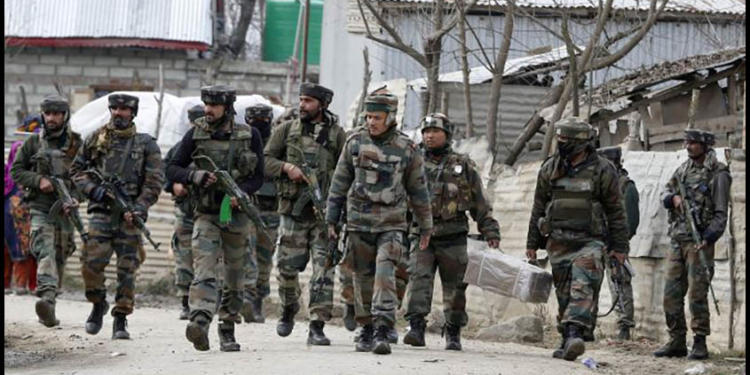The Congress manifesto which seemed more like a desperate expression of appeasement than a visionary document to take India’s growth story forward, has taken a highly controversial stance on the Kashmir issue. It seems that the Rahul Gandhi led Congress has fallen prey to populism in the run up to the Lok Sabha polls. In order to make petty political gains, the Congress Manifesto has gone on to politicise even the Armed Forces Special Powers Act (AFSPA) in the state of Jammu & Kashmir.
On the issue of AFSPA, the Congress Manifesto states, “The Armed Forces (Special Powers) Act and the Disturbed Areas Act in the state will be reviewed and suitable changes will be made to balance the requirement of the security and protection of Human Rights.” Not only this, the Manifesto also promises to, “Review the deployment of Armed Forces, move more troops to the border to stop infiltration completely, reduce the presence of the Army and CAPFs in the Kashmir Valley, and entrust more responsibility to the J&K police for maintaining law and order.” A report from Aaj Tak revealed the fact that sources in the army have expressed their concern about the Congress Manifesto’s promise of reviewing the ASFPA as well. The army sources stated the lack of army presence could potentially make the situation in areas such as Anantnag unmanageable.
It seems that in order to make a political statement ahead of the 2019 Lok Sabha polls; the Congress has completely lost touch with ground realities. The fact remains that the AFSPA is a necessity and an enabling tool as far the Armed Forces’ fight against terrorism in the valley is concerned. In order to combat the menace of terrorism in the valley and eventually defeat Pakistan-sponsored terrorism in the valley, the deployment of the Army and the CAPFs is indispensable. Application of AFSPA is critical to the success of the Armed Forces against terrorism. However, the Congress has casually proposed the removal of AFSPA and has shockingly gone to the extent of “reviewing deployment of the Armed Forces” in the valley.
It seems that the Congress leadership is either unaware of the intricacies of the Kashmir issue or is simply ignorant of the same. The AFSPA was enacted in order to effectively empower the members of the Armed Forces deployed in disturbed areas to carry out their functions smoothly and efficiently. Mere deployment of the Armed Forces without conferring special powers upon them would be of no avail. The powers conferred upon the Armed Forces are more in the nature of functional powers aimed at ensuring that the Armed Forces are able to respond to the special needs of a terror-infested area or disturbed area. This is the reason why many of these powers are similar to the ones conferred upon the local police under the Code of Criminal Procedure, 1973. The AFSPA is also a means of providing protection to the Armed Forces against malicious, vindictive and frivolous prosecution.
It must also be kept in mind that the Army leadership is of the opinion that the time has not yet come for any rethinking on the AFSPA. In an interview last year, Chief of Army Staff, General Bipin Rawat, had made it clear that the time had not yet come to rethink on AFSPA. He had also said, “The AFSPA is an enabling provision which allows the Army in particular to operate in such difficult areas and let me assure you that the Army has got quite a good human rights record.” It is clear that the AFSPA is a matter of necessity. However, the Rahul Gandhi led party’s manifesto makes the folly of politicising a sensitive issue like national security and dragging the AFSPA into a desperate political debate even without considering the opinion of the army leadership. As such the manifesto simply promises a review of the legislation without making any express mention of holding consultation with the Army over this subject.
The manifesto also makes an absurd statement about Article 370 of the Constitution of India. The Congress manifesto has stated, “Congress affirms that the whole of Jammu & Kashmir is part of India. We also acknowledge the unique history of the State and the unique circumstances under which the state acceded to India that led to the inclusion of Article 370 in the Constitution of India. Nothing will be done or allowed to change the Constitutional position.” It is bizarre how the Congress seems to be imposing its opinion upon the country. By stating that a change in the constitutional position won’t be allowed, it seems that the Congress is suggesting that it is not open to even a democratic initiative to do away with the controversial provision. Congress allies in the state of Jammu & Kashmir, Omar Abdullah and Mehbooba Mufti have gone to the extent of threatening against any move to abrogate Article 370. It seems that the Congress has now joined the league of such parties which have issued threats against the abrogation of Article 370 in the past.
By making bizarre and politically motivated promises about the sensitive issue of Jammu & Kashmir, the Congress seems to have shamelessly sidelined national security in a desperate bid for survival in India’s political landscape.




















